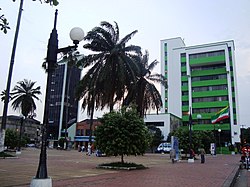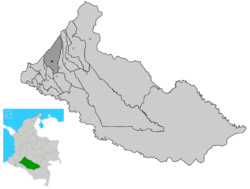Florencia, Caquetá: Difference between revisions
m Stub-sorting. You can help! |
No edit summary |
||
| Line 7: | Line 7: | ||
|motto = |
|motto = |
||
|type = [[Municipalities of Colombia|Municipality]] and town |
|type = [[Municipalities of Colombia|Municipality]] and town |
||
|image_skyline = |
|image_skyline = Plaza Pizarro.jpg |
||
|image_caption = |
|image_caption = Downtown of Florencia |
||
|image_flag = |
|image_flag = |
||
|image_seal = |
|image_seal = |
||
Revision as of 14:21, 5 April 2011
You can help expand this article with text translated from the corresponding article in Spanish. (January 2011) Click [show] for important translation instructions.
|
Florencia | |
|---|---|
Municipality and town | |
 Downtown of Florencia | |
 Location of the municipality and town of Florencia, Caquetá in the Caquetá Department of Colombia. | |
| Country | |
| Region | Amazonas Region |
| Department | Caquetá Department |
| Population | |
• Total | 157,450 |
| Time zone | UTC-05 (Colombia Standard Time) |
Florencia (Template:Lang-en) is a municipality and capital city of the Department of Caquetá, Colombia. It is the most important city in southeast Colombia because of its population as well as its more than a hundred years of history. It is the boundary between mountains and the Amazon. It lies on the Orteguaza River which flows into the Caqueta River. Its population is roughly 160,000.
History
Florencia was founded on December 25, 1902 by Capuchin Friar Doroteo De Pupiales (1876-1959) Born in Pupiales, Nariño, Colombia.
Geography
Florencia is located by the steps of the Cordillera Oriental mountain range. The municipality of Florencia limits to the north with the Huila Department and the municipality of El Paujil, to the east with the municipalities of El Paujil and La Montañita, to the south with the municipalities of Milán and Morelia, and to the west with the municipality of Belén de Andaquies and the Huila Department.
